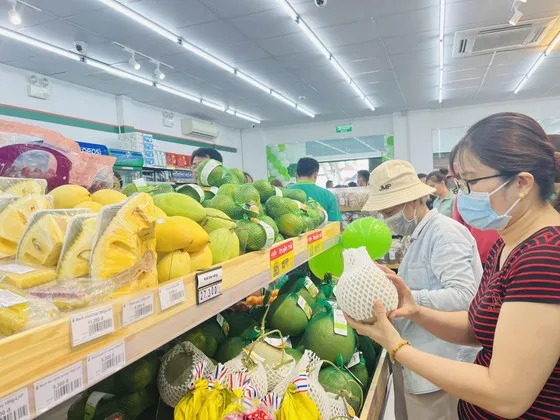
Captivation in a Market of 1.4 Billion People
As per a report from the Ministry of Agriculture and Rural Development, the combined exports of agricultural, forestry, and fishery products in 2023 reached USD 53.1 billion, experiencing a slight dip of 1.2% compared to the previous year. The noteworthy markets for Vietnamese agricultural products remained China, the US, Japan, the EU, and ASEAN, holding their positions as the top five export destinations. However, with the exception of the Chinese market, which demonstrated positive growth, Vietnam's agricultural exports to other key markets experienced negative trends in 2023.
Specifically, agricultural product exports to China reached USD 12.2 billion, marking a significant 17% increase compared to 2022 and constituting 23% of the total export value of the entire agricultural sector in 2023. Consequently, China officially surpassed the United States to become the largest customer of Vietnamese agricultural, forestry, and fisheries products.
One standout product that left a lasting impression in this market of 1.4 billion people in 2023 was durian, boasting a total export value of USD 2.3 billion and capturing 32% of the durian market share in China. Ms. Ngô Tường Vy, the Director of Chánh Thu Fruit Import-Export Company, emphasized that there is still considerable potential for exporting fruits in general and durian in particular to the Chinese market. In fact, in 2023, numerous businesses faced challenges in meeting the demand for durian products from their partners, and there is a unanimous consensus that this expansive market of 1.4 billion people represents a fertile ground for further opportunities.
Cassava, a notable agricultural commodity, has contributed significantly to Vietnam's export revenue, particularly in the Chinese market. Data provided by the General Department of Customs reveals that in 2023, the export of cassava and its derivatives generated USD 1.3 billion, with over 90% of this total directed towards China. Furthermore, various other agricultural products experienced substantial growth in exports to China during the same period. Rice exports saw a notable increase of 19.6%, cashew nuts surged by 55%, and coffee witnessed a growth of 10.3%.
In addition to agricultural products, numerous aquatic goods have identified China as a pivotal market. Despite a 20% decrease in pangasius exports to China compared to 2022, China remains the primary importer of pangasius from Vietnam. Ms. Thu Hằng, an expert in the pangasius market at the Vietnam Association of Seafood Exporters and Producers (VASEP), noted that Chinese consumers continue to be Vietnam's primary clientele for pangasius consumption. As of the conclusion of 2023, Chinese businesses actively stockpiled goods in preparation for the Lunar New Year holiday, catering to the demands of hotels, restaurants, service industries, and tourism sectors.
Regarding shrimp products, while exports to China experienced a general decline in 2023, the reduction was comparatively modest when compared to other major import markets.
Pace Quickens for 2024
Mr. Trần Thành Nam, Deputy Minister of Agriculture and Rural Development, has revealed that China has given its approval to include more key Vietnamese fruits and expedite the completion of necessary procedures. Notably, there is a keen interest in opening the market to Vietnamese avocados and passion fruits. Mr. Nam shared, "This is indeed positive news for farmers cultivating these agricultural products in the Central Highlands and Mekong Delta."
Of particular significance is China's high regard for Vietnamese durian. This development is bolstering confidence in Vietnamese fruits and vegetables, with a targeted turnover of USD 6-6.5 billion set for the entirety of 2024. Durian, in particular, is expected to maintain its accelerated growth, aiming to dominate the market with a targeted turnover of USD 3-3.5 billion. Projections anticipate that the Chinese market will constitute approximately 80% of Vietnam's fruit and vegetable export market share this year.
Deputy Minister Nam also disclosed another encouraging piece of news, indicating that both countries will facilitate the return of Vietnam's ornate spiny lobster to the Chinese market. This involves incorporating the necessary provisions into the protocol on the export of fishery products from wild catch sources. Historically, China has held a significant share, nearly 99%, of Vietnam's lobster export market. However, in May 2023, China implemented a wildlife protection law along with a list designating certain wild animals for protection, including ornate spiny lobsters. Consequently, by August 2023, Vietnam's ornate spiny lobster exports to China had come to a standstill.
In addition to the positive development regarding ornate spiny lobsters, various industry sectors are optimistic about the growth potential in the Chinese market for the current year. Concerning shrimp, according to the Vietnam Association of Seafood Exporters and Producers (VASEP), the Red Sea conflict is driving up shipping costs. This increase may lead Ecuador to reduce its shrimp exports to China due to the heightened shipping expenses. This situation presents an opportunity for Vietnamese shrimp in the Chinese market, given its proximity and lower logistics costs. The initial months of 2024 are anticipated to witness a slight recovery in shrimp exports to China. As for pangasius, Vietnam is hopeful that China will emerge as a high-growth area for pangasius consumption in 2024.
Evidently, China remains an enticing market for numerous Vietnamese businesses, leveraging advantages such as a geographically favorable location leading to low logistics costs and shared cultural preferences in consuming agricultural products. However, navigating this market has become more complex as China progressively introduces stricter technical quality standards for imported goods, including those from Vietnam.
Turning the focus back to the durian fruit, Vietnam finds itself not only in competition with Thailand but also anticipates future rivalry with Malaysia and the Philippines. Deputy Minister Trần Thanh Nam acknowledges the high regard for Vietnamese durian but issues a cautionary note regarding quality standards. He emphasizes that both farmers and businesses engaged in durian cultivation and exportation must prioritize ensuring the quality, design, and origin of goods when dealing with the Chinese market. This emphasis on quality is considered essential for establishing a sustainable presence in this competitive market.




















